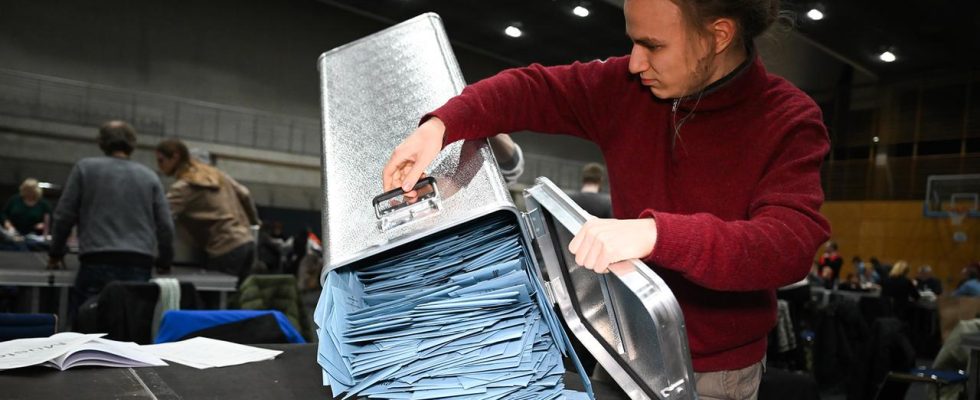According to the election management, the partial repeat of the federal election in some districts of Berlin took place without any major incidents. The votes are now being counted and results are expected later this evening.
The vote on the partial repeat of the federal election in Berlin has ended. The polling stations closed at 6 p.m. From the perspective of the state election authority, the day went smoothly – apart from a few small delays.
There will be no forecasts and projections as usual. Results are expected later in the evening. The state returning officer assumes that a provisional overall result can be announced after midnight.
By midday, only a few eligible voters had cast their votes – at 12 p.m. turnout was around 25.4 percent. That was two percentage points less than in the 2021 main election. At 4 p.m., turnout was 40.2 percent – almost 4 percentage points lower than in the original vote.
At that time, in addition to the election to the Bundestag, there were also elections to the House of Representatives, the district council assemblies and a referendum. The elections at the state and district level had already been completely repeated in February 2023.
This Sunday, voting took place in 455 of 2,256 electoral districts and the associated postal voting districts, i.e. around a fifth. Around 550,000 people were entitled to vote.
Celebrities could lose direct mandate
The election in the capital will not change the majority in the Bundestag. The proportion of eligible voters in the total number at the federal level is only 0.9 percent. However, small shifts are possible. Some MPs could lose their seats in the Bundestag, others could move into parliament.
Some prominent names could also lose their direct mandate: the former Minister of State for Culture Monika Grütters (CDU), the former Governing Mayor Michael Müller (SPD) and SPD General Secretary Kevin Kühnert. In this case, however, they would still remain members of the Bundestag because they are secured by high places on their party’s state lists. In return, MPs who are at the bottom of the list would lose their mandate.
Serious breakdowns in 2021
The election had to be repeated because there were a number of mishaps on September 26, 2021: long queues in front of polling stations, missing or incorrect ballot papers and a temporary interruption in voting in some places. The Federal Constitutional Court ruled in December that the federal election must therefore be repeated in 455 Berlin electoral districts.
According to state returning officer Stephan Bröchler, important precautions have been taken this time to ensure that everything runs smoothly. “The mistake must be cured and only we, the citizens, can do that,” said Bröchler that morning while casting his vote.
Minor delays in the morning
In two cases there were delays in the voting process. In a polling station in the Pankow district, a key for a locked room with the voting documents was missing, as Bröchler described. The electoral board did not receive the key from the daycare center there. Documents were then delivered by the district, so that the restaurant opened at 8:40 a.m. with a 40-minute delay.
In Kreuzberg, according to Bröchler, an electoral board was delayed due to an accident with a taxi, so that the polling station in question also started late. “This can happen with the best organization,” said the state returning officer. At a polling station in Pankow, a board member was replaced by his deputy because he was said to have been “uncooperative”. There were no delays there.
Voting took place in all twelve Berlin federal parliamentary constituencies, although to very different degrees. The hardest hit was Pankow, where the votes of more than 85 percent of voters were annulled. This was followed by Charlottenburg-Wilmersdorf (42.7 percent), Friedrichshain-Kreuzberg-Prenzlauer Berg Ost (33.8 percent) and Reinickendorf (31.7 percent). In almost all other constituencies, less than ten percent were called to vote again.
In the 2021 federal election, the SPD became the strongest force across Berlin (23.4 percent). This was followed by the Greens (22.4 percent), the CDU (15.9 percent) and the Left (11.4 percent). The FDP received 9.1 percent, the AfD 8.4 percent, other parties received 9.4 percent. Nationwide, the SPD was in first place, followed by the Union, the Greens, the FDP and the AfD.

